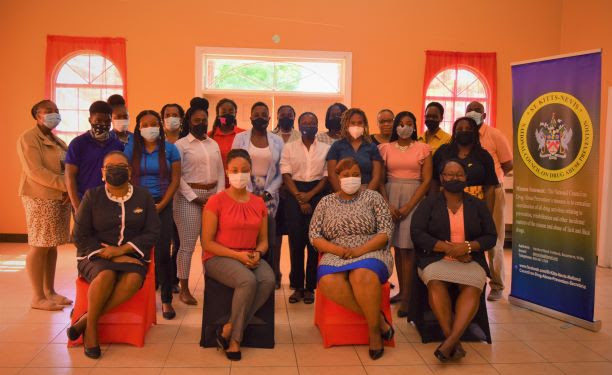Basseterre, St. Kitts, April 22, 2021 (SKNIS): With the growing concern over the increase in the use, misuse, and abuse of cannabis (marijuana) among youth in the Federation of St. Kitts and Nevis, St. Kitts & Nevis National Council on Drug Abuse Prevention Secretariat held a training session for education counsellors on Monday 19th April 2021, at the Jessups Community Center in Nevis.
Mrs. Karimu Byron-Caines, Director of St. Kitts & Nevis National Council on Drug Abuse Prevention Secretariat, an agency that falls under the Ministry of National Security, said that part of the responsibility of the Secretariat “is to ensure that effective prevention, treatment, and other intervention programmes through education and training are made available to the persons we serve in this Federation.”
“We have had many calls, numerous calls, especially lately, of persons expressing concerns of the increase in marijuana use, misuse and abuse amongst our adolescents in the Federation, and as such we have had official overseas training through the Organization of American States (OAS) where Miss Zahra Jacobs, your trainer for today travelled to Mexico to undertake this training in Cannabis Youth Treatment Series One.”
Mrs. Byron-Caines said that the manual and training are “designed to help train substance abuse treatment counsellors and other counsellors to conduct a brief five-session treatment intervention for adolescents with cannabis use disorders presenting for outpatient treatment. It combines two sessions of Motivational Enhancement Therapy (MET) and three sessions of Cognitive Behavioural Therapy (CBT) in a group format.”
“We all know, and we are aware of the effects of marijuana, especially in our youths. We have heard it especially in our schools where the students are sometimes coming to school high, causing some behavioural problems. We are seeing challenges with the academic performance and so we are pleased to be offering you the front-line counsellors hands-on material for an effective programme. It’s going to take you effort; it’s going to take you dedication; it’s going to take some planning, but the National Council on Drug Abuse Prevention is here to support you, to assist you in any way,” Mrs. Byron-Caines said.
Ms. Zahnela Claxton, Principal Education Officer (PEO) in the Department of Education on Nevis, said that the training will prove beneficial.
“This training will no doubt provide our counsellors with additional tools, which they will surely find useful. In an age where edibles and smoking are the norms of our young people, it is imperative that we provide the necessary support for them,” Ms. Claxton said.
Ms. Sandra Maynard, Director of Social Services in the Ministry of Social Development in the Nevis Island Administration, welcomed the training and said that with the increased cannabis use in high schools, it is important to reach out especially to you At-Risk-Youth and youth offenders.
“In January of 2020, I attended the unveiling of the CFYR (Communities, Families and Youth Resilience) Project Baseline online study of communities in our Federation and paid special attention to results of young persons’ involvement in delinquent activity. Of those surveyed in the 10 to 29 age group in St. Kitts and Nevis, youth in their controlled communities were using marijuana or other illegal drugs at a rate of 47.8 percent,” said Ms. Maynard.
She added: “The controlled communities if I understand correctly, were those identified by the project as the high-risk communities across the Federation. Those youth not in controlled or high-risk territories admitting to using marijuana and other drugs was reported as being 23.7 percent. To be fair to the efforts of my CFYR colleagues, there was some reported reduction of controlled substances by the end of the project, but that number reported 30.5 percent, but 30.5 percent is still one that gives cause for serious concern, and more importantly, a call to action.”
Ms. Maynard added that the COVID-19 pandemic has had mental health effects on children and youth and some perhaps have turned to drugs to help them to cope.-30-







